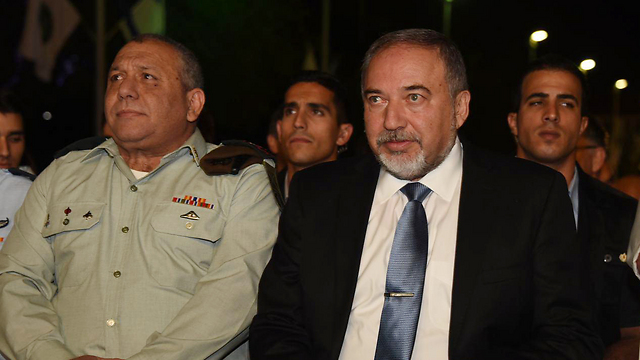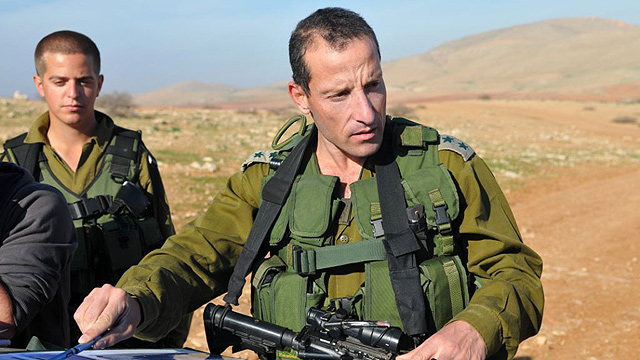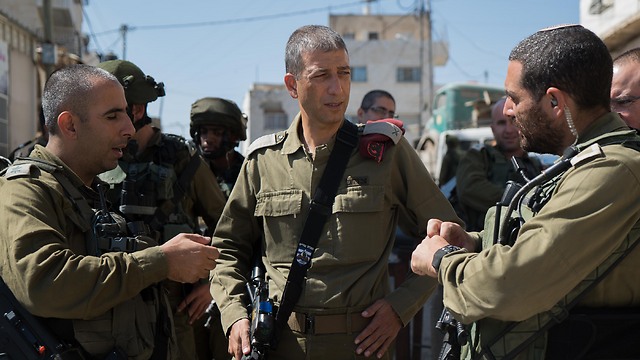
What will the second half of Eisenkot’s term as IDF chief look like?
With renewed power following the extension of his term, the chief of staff is leaving his illness behind and looking to the future. In his remaining two years in office, he will have to deal with the explosive reality in the West Bank during the Trump era, promote promising generals and prepare the IDF for the next decade.
Shortly before the meeting, he decided to raise the Central Command’s alertness level ahead of a violent outburst in the West Bank to the same alertness level that exists vis-à-vis the Gaza Strip.
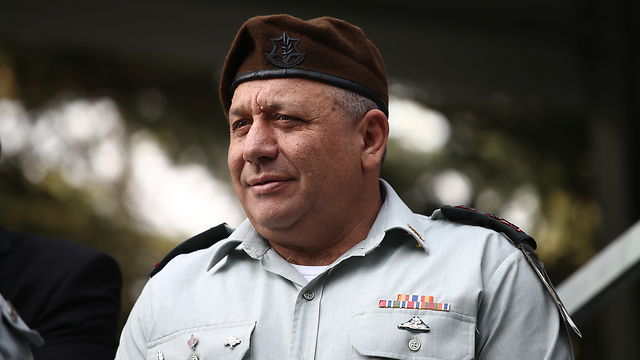
In the past 18 months, the army has allocated some NIS 4 billion (about $1 billion) in order to provide an operational response to a possible surprise on the borders. In the work plan for 2017, Gaza was given preference, a great deal thanks to the PR surrounding the Hamas tunnels. The working premise was that Gaza is the weak, less stable link among the five fronts wthat could suddenly erupt: The Golan Heights, Lebanon, Sinai, Judea and Samaria and Gaza.
But new figures were introduced in the beginning of the year, changing the strategic picture and opening a new chapter of uncertainty, which the army must interpret and perhaps even add other bricks to the building of power in order to deal with the situation. The plan known as “the IDF’s strategy,” which has so far served as the power building’s foundation, will undergo renovation and completion.
On January 18, two days after the Glilot meeting, Defense Minister Lieberman went public with the decision to extend the chief of staff’s term. As far as Eisenkot was concerned, one layer of uncertainty had been removed, but he was troubled by a different problem: The operation he was about to undergo the following day.
Now that those two obstacles have been removed, he is returning to his office for two more years, in which he will try to navigate the ship by adapting it to the changes taking place in the region and around the world. His next two years as chief of staff may be characterized by much more turmoil, with much more uncertainty, compared to the past two years.
The Trump era is one of the main variables that have entered the picture, and it is already shaking the ground in the West Bank. The chief of staff’s decision to raise the Central Command’s preparedness was made when the talk began about moving the US embassy to Jerusalem. The American policy is unclear at the moment, and in the meantime both the Jews and the Palestinians in the territories are conveying unrest. The settlers’ expectations for a dramatic change, and the anxiety among the Palestinians, may break through the damn that has been curbing the flood of violence until now.
The changes in the American administration are not the only thing shaking the ground. So is the scent of elections detected by Israeli politicians. Such an atmosphere creates radical comments and moves on the part of the statesmen, such as predictions of a summer war in Gaza or announcements of construction in the territories. And when politicians smell elections, the army’s recommendation have very little influence on the political leadership’s considerations, and all that is left for the army is to prepare for possible outcomes on the ground.
The Trump era is leaving its mark not only on the territories. While the new administration is busy shaping its American policy in Syria, Israel has an interest in increasing its level of influence on the regional processes. The IDF is a main factor in raising the profile of the Israeli involvement in the areas on fire. This includes not only direct military activity, like airstrikes attributed to Israel, but also tight cooperation with other security organizations in neighboring countries, which are operating under the American umbrella.
On the eve of his visit to Washington, Netanyahu sat down with the General Staff and listened to briefings and recommendations on how the Israeli security interests can integrate into the American policy in the region. The Trump administration is demanding, for example, the establishment of at least two secure areas for Syrian refugees: One near the Turkish border, and the other on the Syria-Jordan border, where Israel has clear interests. Stability in Jordan and in the Golan Heights are a key feature, as far as Israel is concerned, for any future agreement in Syria. In order to make it clear to Syria and to Iran and Israel is serious about this, the Northern Command is preparing for a reality in which the Assad regime will regain control of the Syrian Golan Heights.
While the past two years have been defined by the army as a “window of opportunity” for building the power, the next two years are being defined as an “influential time.” Israel wants to become much more involved in regional agreements that have implications on its security. Israel has anyway been engaging in the past few years in military diplomacy with its partners in a bid to thwart the Iranian threat on the countries of the Middle East. This includes low-intensity fighting, aimed at stopping the Iranian satellite groups from growing stronger.
A written and binding combat doctrine regulates the direct and indirect use of military force as part of the shared regional interests. The plan is that the Sunni alliance, directed by the Trump administration, will curb the influence of the Iran-led Shiite axis. The new doctrine takes into account that Israel is cooperating with Russia for the first time, at least on the level of understandings, out of an assumption that the Russians plan on staying here for a long time.
Succession battle heating up
During the second part of Eisenkot’s term, which began last week, he will also complete the round of appointments that he will work with till the end of his term. In the next two years, the entire General Staff will be in his image.
In May, Major-General Aviv Kochavi will take office as deputy chief of staff instead of Major-General Yair Golan, and that will basically kick off the succession battle between the two generals over Eisenkot’s positon. Kochavi’s appointment reflects not only Eisenkot’s appreciation towards him as a military man. It is also a statement made by a chief of staff with a lot of self-confidence, who feels very comfortable in his seat. His comments about the Elor Azaria affair did not affect his image, definitely not in the army.
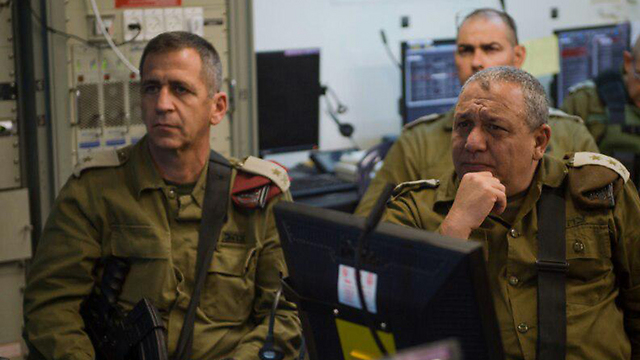
Next month, the state comptroller will release a report criticizing the evaluations of the Military Intelligence Directorate, which was led by Major-General Kochavi, on the eve of Operation Protective Edge. The parts of the report which focus on the missing measures, skills and combat doctrines for dealing with the tunnels were humbly accepted by the IDF, which is now investing billions in fixing the faults, including the construction of a physical barrier with technological components for the detection of tunnels around the Gaza Strip.
The army does not accept, however, the criticism on its working premises regarding the tunnel threat on the eve of the operation, and believes that the picture presented by the comptroller is too black and inaccurate considering the results of the operation—a relative calm and deterrence.
If Eisenkot had any doubt in regards to Kochavi’s appointment as the next deputy chief of staff, it had nothing to do with the comptroller’s report, but only with the fact that there was another worthy candidate—Major-General Sami Turgeman.
The rest of the appointments announced by Eisenkot were received without reservations or noise, which is quite unusual. People who were not selected retired quietly, even if they did feel deprived. Major-General Amikam Norkin, head of the IDF’s Planning Directorate, was supposed to replace Major-General Amir Eshel as the Air Force commander this coming May. Eisenkot has decided to postpone the appointment until Norkin’s designated replacement in the Planning Directorate, Brigadier-General Amir Abulafia, completes an 18-month term as commander of the 162nd Armored Division, one of the most important centers of knowledge of the offensive activity in the Gaza Strip. If Gaza catches fire in the summer, although there are no warnings that that could happen, the replacement may wait until September. The unexpected departure of Major-General Hagai Topolansky, head of the IDF’s Manpower Directorate, after his computer was stolen, did not create any shocks either. Major-General Moti Almoz, who replaced him, will continue serving simultaneously as the IDF spokesperson till May.
In the latest round, Major-General Tamir Yadai was appointed head of the Home Front Command, Major-General Muni Katz was appointed commander of the Depth Corps, Major-General Nadav Padan was appointed head of the Computer Service Directorate and Major-General Eli Sharvit was appointed Navy commander.
All the appointments made by Eisenkot in the two rounds have one thing in common: They are not only people who he had worked with for a long time, got to know personally and developed a relationship of trust with—they also all come from the top of the combat systems. That is the precondition, and that is also the message.
There is no wonder that the list of candidates for promotion in 2018, who will serve the next chief of staff, includes veteran brigadier-generals like Lior Carmeli (currently the Judea and Samaria Division commander), Amir Baram (commander of the 91st Division), Mopti Baruch (head of the Doctrine and Training Division), Yitzhak Turgeman (head of the Operations Division) and others.
While he was recovering at home, Eisenkot was able to dedicate some time to his biography reading hobby, to surf the Internet (mainly news websites) and to think about the appointment of the next IDF spokesperson. As far as he is concerned, the IDF spokesperson is not just another professional appointment. His model is a person who grew up in the army, not in the media. It has to be someone who is very close to him, with whom he will be able to share his thoughts and hesitations.
He found the right person for the job right under his nose: His military assistant, Colonel Ronen Manelis, who has been working with him for years. Not to mention the fact that he is also attracted to the field: As a cadet in the Tactical Command College, he volunteered to produce and edit Army Radio programs. Now he will have the chance to satisfy his natural curiosity as an intelligence person on the other side, in the media world.
Air Force revolution
Every Sunday, at 7:30 am, the chief of staff holds a discussion to follow up on the implementation of the IDF’s multi-year plan and the building of power with the relevant generals. Eisenkot is fighting tooth and nail for the Gideon Plan. Fortunately for him, Finance Minister Moshe Kahlon (Kulanu) is a convenient partner, who is promising the army budgetary stability.
In late 2016, the General Staff Forum engaged in self-examination: Are the directions of the work plan correct? Is the money going where it should? The answer is yes. The Gideon Plan will reach maturity this year upon the completion of the equipment supply levels, and will provide a response to the threats in the three to five coming years. In 2017, the Air Force will undergo another revolution, alongside the reception of the F-35 planes: An increase in unmanned aircraft. The world of cyber will also receive a further boost.
In the summer, the Planning Directorate will submit a plan on the building of power in the years 2020 to 2030 for the approval of the General Staff and political echelon. In this plan, the IDF is focusing again on its preparedness vis-a-vis a nuclear Middle East. The restrictions on Iran as part of the nuclear agreement will be lifted in 2025, and the army must adopt the most advanced technological solutions in light of the old-new threat: A lot of artificial intelligence, unmanned weapons, new combat perceptions, and perhaps even a different organizational structure. It’s possible that there will no longer be a need for the regional commands, and that the military organization will look more like technological incubators. That is also something the IDF is already thinking about today.
In this whole race, there is one critical issue which remains behind: The individual. In the past two years, the army has fired 2,500 people, including 120 officers in the ranks of lieutenant-general to brigadier-general. Entire systems which are not directly related to the operational activity have been cut down by 17 to 25 percent—the Military Rabbinate, the chief education officer, the Behavioral Sciences Department, the chief of staff’s advisor on women’s affairs, and more. The career army has dropped beneath 40,000 people. The new contractual engagements model for the career army—which includes changes in the pension structure, early contract annulment and more—has negatively affected people’s feeling of security. Even the reservists are showing signs of wearing out.
And if that were not enough, for over a year the army has been dealing with a scathing report by the commissioner for IDF soldiers' complaints about the poor maintenance of the War Reserve Stores Units as a result of problematic treatment of the professionals serving in them. The IDF’s Technological and Logistics Directorate, headed by Major-General Aharon Haliva, is now taking over the War Reserve Stores Units. Hundreds of millions of shekels will be invested in them, and the non-commissioned officers serving there will get a significant increase in their salary. A young non-commissioned officer in initial career service will receive an addition of NIS 1,500 a month. The big money, however, will be invested in building modern storerooms.










